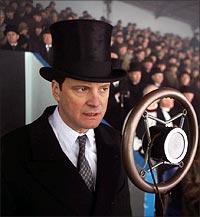 | « Back to article | Print this article |
 Shaikh Ayaz reviews The King's Speech. Post YOUR reviews here!
Shaikh Ayaz reviews The King's Speech. Post YOUR reviews here!
Amongst its many achievements -- and let's view this film outside of its Oscar conquests -- director Tom Hooper's searing drama on the British royalty gets it right on two counts: a remarkable script-screenplay and an adroit craftsman's choice of performers.
The King's Speech, whose title itself conveys what you are to expect, employs its bare narrative with a mature novelist's skill. Though there are no major plot developments or twists as such, its two lead characters and their good-humoured (and at times heated) interactions demand more than just your involvement.
They draw you into their world which is as real as yours, in which there are insecurities and obstacles in a life of imperial splendour. It humanises those insecurities and obstacles and it seems to boldly state than suggest that it takes as much effort, if not more, to overcome them.
Colin Firth and Geoffrey Rush are the edifice, two inordinately gifted actors -- and more than that, absolutely cherry-picked by the one who knows the variety well -- on which The King's Speech stands unshakeably. It's clear that the film itself is dedicated to their friendship, a strange union of two people who seem different on surface but united in their intent and duty.
In more ways than one, The King's Speech reaffirms what most filmmakers take for granted, that a film should stay rooted in its culture and that its characters, as far as possible, must belong to that culture. So, if Firth and Helena Bonham Carter, who play the King and the Queen, are in real life British, Rush, an Aussie quack, is indeed Australian by birth.
Largely a performance-goaded film than plot-driven, The King's Speech has its defining moments shot on Firth and Rush and that establishes in no uncertain terms that the film has its priorities in place. The interactions between Firth, who's King George VI with an acute speech disorder and Rush, the therapist that he's qualification-wise not, produces humour, tension, rage, awkwardness and embarrassments in equal measure. And that's how it should have been, for theirs is a relationship of 'equals.'
Every time the King musters the courage to speak, he struggles, embarrassingly grimaces, as if forming bubbles in his mouth and presents himself to be a weak monarch with a weak voice.
In a deeply ironical moment, the King muses, with abject submission, "If I am King, where is my power? Yet, I am the seat of all authority because they think that when I speak, I speak for them."
In that very statement lies a dramatic paradox because if the King is weak -- and we are talking of a King who controls not only the UK but other colonies, too, in the face of a growing German threat -- the subject is weak.
In his King, Firth is refined, restrained and irascible given to outbursts of affection, diffidence and gratitude. Unlike the King's tongue, Hooper's direction doesn't bumble, demonstrating an unflinching faith in his voice as a creator.
Rediff Rating: 